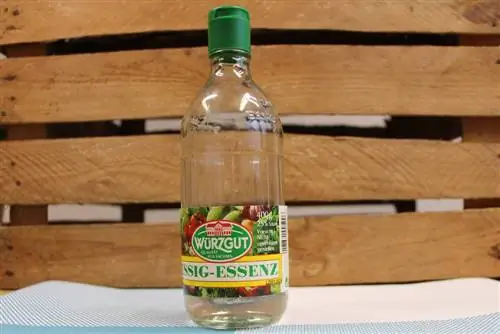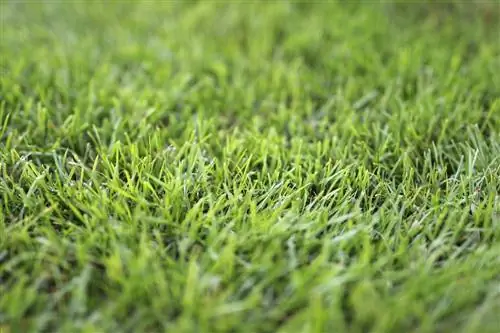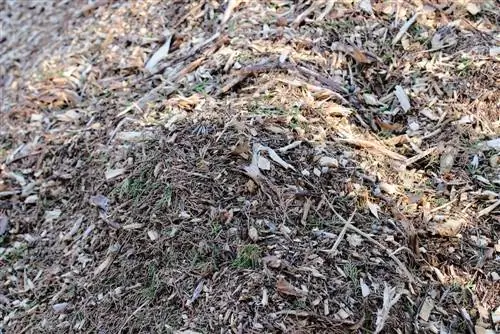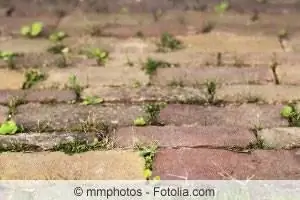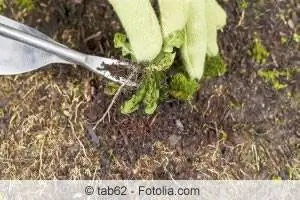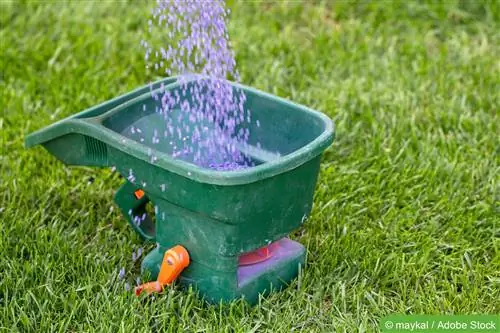- Author admin caroline@plants-knowledge.com.
- Public 2023-12-17 03:39.
- Last modified 2025-01-24 12:45.
For gardening, vinegar can be used as a natural weed killer. The substance that makes vinegar aggressive against weeds is called acetic acid. The higher the acetic acid content in vinegar, the more deadly it is to the plants. Regular table vinegar, used in the home for salads and the like, has a relatively low percentage of acetic acid (5 to 6%). Vinegar essence contains 25% acetic acid and is therefore significantly more concentrated. However, using vinegar against weeds is by no means as harmless as is generally assumed.
Application
If you want to fight weeds naturally, you should take a closer look at the unwanted plants in advance. Vinegar and vinegar essence are not a miracle cure and do not have a selective effect only on weeds. Before you randomly spread vinegar around your garden and cause more damage than you actually want, you should pay attention to the following tips:
- use only in small quantities
- Treat weeds before sowing
- the younger and smaller the plant, the more effective the vinegar is
- how to prevent a new generation of plants
- depending on the weed, only multiple applications usually help
- Time: Spring and Summer
- only spray or brush directly onto the respective weed
- additionally remove flowers and seed heads
Tip:
Some gardeners swear by briefly boiling the vinegar before treatment and spraying it over the plants while it is hot. This has the advantage that the heat also causes problems for the plants. Finally, hot water also kills the cells of the plants.
Best time
Check the weather forecast for your area and wait for a few sunny days in the forecast. Then, at the start of this period, spray or brush the vinegar onto the plants you want to control. There are two important reasons why treatment should take place in dry and sunny weather conditions:
- As much vinegar as possible must stick to the leaves so that it can work optimally. Rain would wash away too much of it.
- The damage to the leaves caused by the vinegar lasts a few hours to days and the effect becomes more intense the more the sun shines on the leaves.
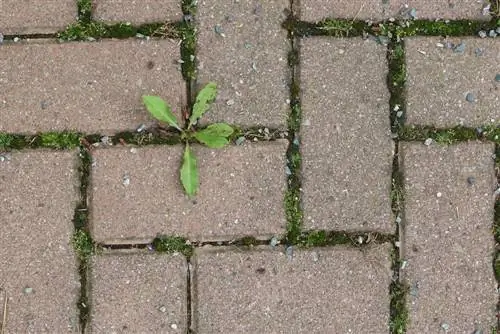
While the results of acetic acid treatment are visible after just a few hours on plants growing in the sun, in shady regions it may take a few days for the leaves to turn yellow and dry out. If the weed plants are already quite large, it is advisable to cut them off in advance and only treat the remains. This means you have to use significantly less vinegar and therefore protect the environment.
Additives
The effectiveness of a herbicide can generally be increased by mixing in a little surfactant (a few drops of soap solution or dishwashing liquid). Although the surfactant does not have a harmful effect on the weeds, it does help the vinegar to do a better job. In order for the vinegar essence to have the intended effect, it must remain in contact with the leaves long enough to penetrate them well. In practice, this is easier said than done, because plants have a waxy coating on their leaves that allows water to simply roll off and protects it from the penetration of foreign substances. The role of surfactants is therefore to counteract this defense mechanism of the plant. This allows the natural herbicide to penetrate better.
Restrictions
If you want to fight weeds in the lawn with vinegar or vinegar essence, for example, make sure to apply the vinegar acid directly to the weeds themselves and not to the grass. The mere fact that vinegar is a natural product does not mean that it cannot be harmful if used in large quantities. Vinegar does not have a selective effect on weeds, it can also cause damage to the lawn or ornamental plants in the garden.
The way vinegar works is simply explained: the acetic acid draws moisture from the leaves of the plant, so that they dry out and die.
So to avoid damage to the lawn and other ornamental plants, you need to apply the vinegar directly to the weeds. This works best with a brush. If you prefer to spray with a flower sprayer, you should only operate the spray lever when the nozzle is directly close to the weeds.
- do not spray on windy days
- do not spray from a distance
- apply directly to the weeds
The fact that meticulous care must be taken to ensure that no other plants are affected makes vinegar for use on lawns not particularly effective, but rather tedious. It therefore makes more sense to use vinegar essence in areas where grass or other desired garden plants are not in the immediate vicinity, for example in the cracks between the curbs of bed borders.
Vinegar Essence
Normal table vinegar has an acetic acid content of 5 to 6 percent. Vinegar essence is significantly more concentrated (up to 25%). In fact, higher concentrations of acetic acid work better and faster. But be careful if you decide to use vinegar essence. The fact that vinegar is a natural product may obscure the fact that it is a concentrated acid that should only be used with special precautions and the necessary respect. When handling concentrated acetic acid products, you should therefore observe the following safety measures:
- can cause severe skin burns and eye damage
- Wear protective gloves made of nitrile or similar resistant material
- Wear eye protection (it is best to keep your eyes closed when spraying)
- ensure adequate ventilation
- Do not inhale spray mist (corrosive to mucous membranes)
- If contact occurs, rinse immediately with water for a few minutes
- See a doctor
Tip:
Given the danger that vinegar essence poses to he alth, the concept of vinegar as a natural weed killer may be questioned. The most natural and safest way to get rid of weeds from your own garden is and remains removal by hand.
How effective is vinegar?
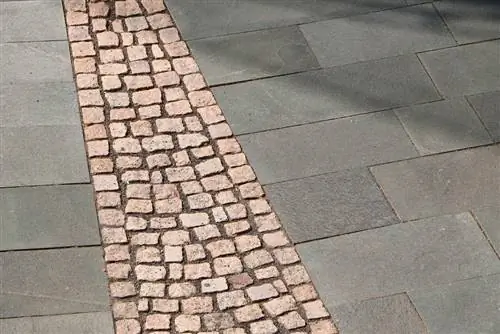
There is another downside to using vinegar as a weed killer. Vinegar does not travel through the plant to the roots, as is the case with many chemical pesticides. In the case of young weeds, the fine roots may also be affected by spraying and die. However, older plants often sprout again after just a few days.
Therefore, you will most likely have to apply the vinegar more than once, as established weeds are often very resistant and stubbornly refuse to go away.
This is especially true for perennial weeds that have been established in the garden for years. Vinegar is more effective on young weed plants and those with annual life cycles.
Annual weeds
- Millet (Digitaria)
- Common panicle (Poa trivialis)
- Blackgrass (Alopecurus myosuroides)
- Air oats (Avena fatua)
- Brome (Bromus species)
- Dog parsley (Aethusa cynapium)
- Amaranthus (Amaranthus)
- Dog chamomile (Anthemis avensis)
- Lady's Mantle (Aphanes arvensis)
- Report (Atriplex species)
- Goosefoot (Chenopodium)
- Broom rocket (Descurainia sophia)
- Hollow Tooth (Galeopsis)
- Buttonwort (Galinsoga)
- Burdock bedstraw (Galium aparine)
- Deadnettle (Lamium)
- Common Ragwort (Senecio vulgaris)
- Soose thistle (Sonchus oleraceae)
- Chickweed (Stellaria media)
- Stinging nettle (Urtica urens)
- Veronica (Veronica species)
Tip:
Annual weeds die off on their own in autumn at the latest. They only reproduce by sowing their seeds. So it helps if you constantly make sure to remove flowers and seed heads so that you have fewer problems with these plants next year.
Perennial weed plants
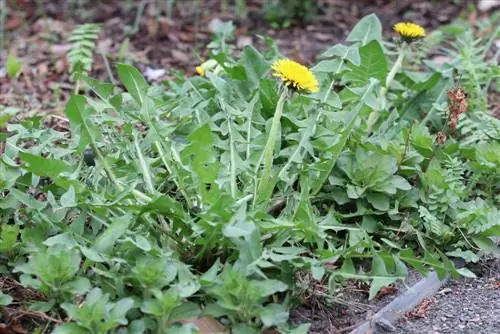
It's not that easy with perennials. For example, the leaves of a dandelion die, but the plant survives the winter in its fleshy taproot to sprout again in the spring. Some plants are not susceptible to acid at all because they have a waxy coating on the leaves or a hairy surface. In these cases, mixing in surfactants (soap) produces better results than pure vinegar. Adding acetic acid directly to the soil is not recommended because the effects on microorganisms and the roots of neighboring plants are difficult to estimate. Important soil inhabitants can die or temporarily move out of the area, so that soil fertility is greatly reduced.
- Dandelion (Taraxacum)
- Quecke (Elymus)
- Brome brome (unawned and soft brome, Bromus inermis and B. hordeaceus)
- Dogtooth grass (Cynodon dactylon)
- Tigernut grass (Cyperus esculentus)
- Gedweed (Aegopodium podagraria)
- Barbelweed (Barbarea vulgaris)
- Shepherd's Ass (Capsella bursa-pastoris)
- Blindweed (Convolvulus arvensis)
- Plantain (Plantago)
- Coltsfoot (Tussilago farfara)
- Great nettle (Urtica dioica)
So it's of little use to put vinegar essence on their leaves and cause them to die. Nevertheless, you can also effectively tackle these stubborn weeds with vinegar:
- remove leaves during the main growing season
- alternatively cut off close to the ground
- Spray vinegar on the parts of the plant that have not been removed
- always remove the flowers immediately
- permanent control
Every time you use the “natural” herbicide acetic acid, the plant dies a little more. With repeated treatment, final death will eventually occur - due to exhaustion.
Joints between paving stones
It is undisputed that vinegar works against weeds. Nevertheless, it is not recommended to use it to a large extent. The acetic acid penetrates the soil and changes the conditions in the soil and groundwater. That's why vinegar is officially one of the banned substances according to the Plant Protection Act (“prohibited household remedies”). The Plant Protection Act regulates which products are permitted and where they can be used. The use of vinegar is generally prohibited on all paved surfaces, whether terraces, sidewalks or garage entrances. Anyone who does not comply with this must expect severe fines. Plant protection products and substances used as such may only be used in open spaces that are used for agricultural, forestry or horticultural purposes.

In plain language this means for all gardeners who maintain paved areas:
The application of so-called home remedies to combat unwanted plants and mosses is prohibited, regardless of the active ingredient! This also applies to active ingredients such as table s alt and acetic acid.
Alternatives
Thermal or mechanical processes are alternatives to chemistry, which also includes the natural product vinegar. These include:
- Flame
- Pouring hot water over it
- Infrared technology
- Joint scraper
- Wire brooms and the like
These procedures are not only permitted aids, they are also significantly more environmentally friendly.
Preventing weeds
There are a whole range of measures to prevent heavy weed growth. Weed growth can never be completely prevented, because the fine seeds that are scattered by these plants and blown away by the wind germinate even under inhospitable conditions, such as in the narrow gaps between paving stones. Weeds are also difficult to prevent in the lawn. However, it can be severely restricted using the following methods:
- Scarify the lawn every spring
- Keep the grass short (so that the weeds don't flower and spread further)
- Cover beds with mulch
- Create weed fleece under paths and paving stones
Ground cover as natural weed protection
Gardeners who properly prepare their beds for the new gardening season in spring can get by with almost no time-consuming weeding. This way you keep your garden more or less weed-free all year round. The best time to plant opponents for unwanted weeds in the bed is early spring for annual plants. Perennial ground cover plants, which keep weeds away for years, can also be planted in autumn.
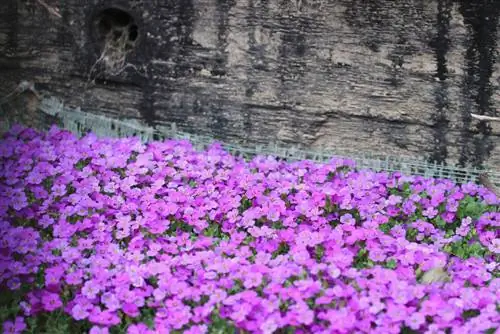
Ground cover plants have clear advantages: They hardly require any work, have no side effects and are guaranteed to be environmentally friendly. Because creeping plants quickly overgrow the ground, they deprive weeds of the light they need to grow and therefore curb wild growth in a truly natural way.
Conclusion
Although vinegar kills annoying weeds, in principle it is no more environmentally friendly than chemical weed killers. Anyone who wants to use vinegar against weeds should be aware that the results are not very predictable. Since the use of vinegar is prohibited on paved surfaces and the effect usually only produces the desired result after repeated use, its use on one's own property should generally be questioned.

